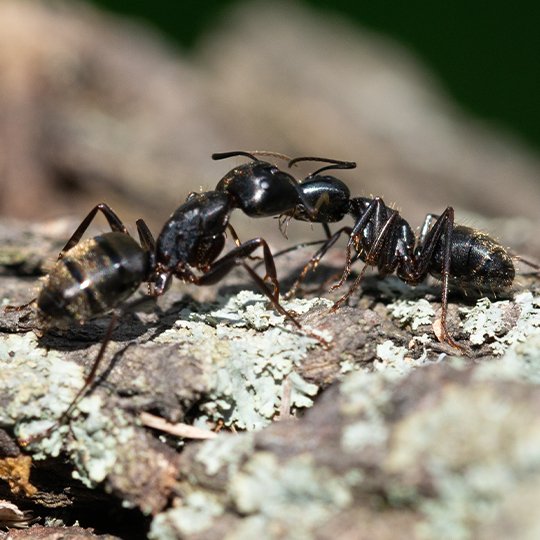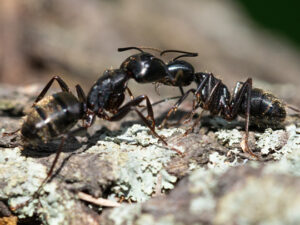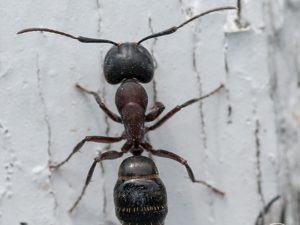
Ants might be fascinating creatures in nature documentaries, but when they march across your kitchen counter in search of crumbs, fascination quickly turns to frustration. These persistent insects can invade homes year-round, creating trails that seem impossible to eliminate and returning even after you think you’ve solved the problem.
The good news? You don’t have to surrender your home to these tiny invaders. With the right knowledge, prevention strategies, and professional support when needed, you can maintain an ant-free environment that protects your family’s comfort and health.
This comprehensive guide will equip you with everything you need to understand ant behavior, implement effective prevention measures, and know when to call in expert help from Town & Country Pest Solutions to ensure your home stays protected.
Understanding Why Ants Invade Your Home
Ants don’t randomly choose which homes to invade. They’re methodical scouts searching for three basic necessities: food, water, and shelter. Once a scout ant discovers these resources in your home, it leaves an invisible chemical trail called a pheromone for other colony members to follow.
Common attractants include pet food left in bowls, sticky spills on countertops, moisture around leaky pipes, and even the warmth of your home during colder months. Understanding these motivations helps you address the root causes rather than just treating the symptoms.
Different ant species prefer different environments. Carpenter ants are drawn to moist, damaged wood where they can build nests, while sugar ants gravitate toward sweet substances in kitchens and dining areas. Pavement ants often enter through foundation cracks, seeking food scraps and establishing colonies in wall voids.
Essential Prevention Strategies for Homeowners
Keep Your Kitchen Spotless
The kitchen serves as ant headquarters in most infestations. Wipe down counters immediately after meal preparation, sweep floors daily, and store food in airtight containers. Pay special attention to areas around the stove, refrigerator, and sink where crumbs and moisture naturally accumulate.
Don’t forget about pet feeding areas. Wash pet bowls after each meal and store pet food in sealed containers rather than leaving bags open in pantries or garages.
Eliminate Water Sources
Ants need water to survive, making even small leaks attractive to colonies. Fix dripping faucets, repair damaged weatherstripping, and ensure proper drainage around your home’s foundation. Check under sinks, around washing machines, and near water heaters for moisture problems.
Clean gutters regularly to prevent water from pooling near your home’s foundation, and trim vegetation that might hold moisture against exterior walls.
Seal Entry Points
Ants can squeeze through incredibly small openings. Inspect your home’s exterior for cracks in the foundation, gaps around windows and doors, and spaces where utility lines enter the building. Use caulk to seal these openings, paying particular attention to areas where different building materials meet.
Replace damaged weatherstripping around doors and windows, and consider installing door sweeps if gaps exist under exterior doors.
Natural Deterrents That Actually Work
Strategic Use of Scents
Certain scents naturally repel ants without introducing harsh chemicals into your living space. Peppermint oil applied to cotton balls and placed near potential entry points can deter many ant species. Coffee grounds sprinkled around outdoor ant trails may also discourage their return.
Cinnamon, both as essential oil and ground spice, creates a barrier that ants typically avoid crossing. Apply these deterrents consistently and refresh them regularly for best results.
Cleaning Solutions That Disrupt Trails
White vinegar mixed with water not only cleans surfaces but also eliminates the pheromone trails ants use for navigation. Spray this solution on ant trails and potential entry points, then wipe clean with a cloth.
Lemon juice offers similar trail-disrupting properties while leaving a fresh scent. Apply directly to areas where you’ve observed ant activity.
Recognizing When DIY Methods Aren’t Enough
Signs of Established Colonies
If you consistently see large numbers of ants despite your prevention efforts, the colony has likely established itself in or near your home. Multiple trails leading to different food sources, ants appearing in new areas of your home, or discovering winged ants (reproductive members) all indicate a more serious infestation requiring professional intervention.
Structural Damage Concerns
Carpenter ants don’t just create nuisance problems; they can cause significant structural damage by excavating galleries in wood. If you notice small piles of sawdust, hear rustling sounds in walls, or discover hollow-sounding wood, contact pest control professionals immediately.
Health and Safety Considerations
Some ant species can contaminate food sources or, in rare cases, cause painful stings. When infestations affect food preparation areas repeatedly or when family members have sensitivities to insect activity, professional treatment becomes necessary for health protection.
How Professional Pest Control Makes the Difference
Comprehensive Property Assessment
Professional pest control technicians understand ant behavior patterns and can identify colony locations, entry points, and contributing factors that homeowners might miss. This thorough assessment forms the foundation of an effective treatment strategy.
Town & Country Pest Solutions conducts detailed inspections that examine both interior and exterior conditions, identifying not just current problems but potential future issues.
Targeted Treatment Approaches
Professional treatments go beyond surface-level solutions. Technicians use specialized products and application methods designed to eliminate entire colonies, not just the ants you can see. These treatments often include both immediate relief and long-term prevention components.
Ongoing Monitoring and Prevention
Professional pest control includes follow-up services to ensure treatments remain effective and to address any new ant activity before it becomes problematic. This proactive approach saves homeowners time, frustration, and potentially costly damage.
Seasonal Ant Prevention Tips
Spring Preparation
As temperatures warm, ant colonies become more active. Conduct thorough exterior inspections, refresh natural deterrents, and address any winter damage that might have created new entry points.
Summer Vigilance
Peak ant season requires consistent cleaning routines and immediate attention to any scout ants discovered in your home. Don’t ignore single ants; they’re often indicators of larger problems developing.
Fall and Winter Protection
Some ant species seek indoor shelter as temperatures drop. Seal entry points thoroughly and remove outdoor attractants like fallen fruit or pet food that might draw colonies closer to your home.
Creating Your Long-Term Ant Prevention Plan
Successful ant prevention requires consistent effort rather than reactive treatments. Develop weekly inspection routines that include checking common problem areas, maintaining cleanliness standards, and addressing minor issues before they escalate.
Document any ant activity you observe, including locations, times, and apparent attractants. This information helps both your prevention efforts and any professional pest control services you might need.
Consider scheduling annual professional inspections even when you don’t have active ant problems. Prevention costs significantly less than dealing with established infestations and potential structural damage.
Protecting Your Home Investment
Maintaining an ant-free home protects more than just your daily comfort. Consistent pest prevention helps preserve your property value, ensures food safety, and creates a healthier living environment for your family.
Ready to take control of your ant problems? Town & Country Pest Solutions offers comprehensive ant control services designed to eliminate current infestations and prevent future problems. Contact our experienced team today to schedule your property assessment and discover how professional pest control can restore peace of mind to your home.











